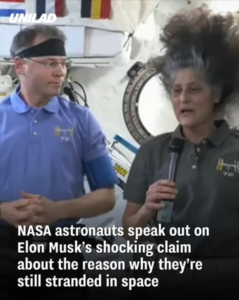In recent developments aboard the International Space Station (ISS), NASA astronauts Barry “Butch” Wilmore and Sunita Williams have addressed claims made by SpaceX CEO Elon Musk regarding the reasons behind their extended stay in space. Initially scheduled for an eight-day mission, the astronauts have now been in orbit for over nine months due to technical issues with Boeing’s Starliner capsule, which was deemed unsafe for re-entry by NASA.
Elon Musk’s Allegations
Elon Musk publicly accused the Biden administration of rejecting SpaceX’s offer to facilitate the astronauts’ return, suggesting that political motives were at play. He claimed that SpaceX could have dispatched another Crew Dragon capsule to retrieve Wilmore and Williams months earlier, but the administration allegedly declined the proposal to avoid granting positive publicity to SpaceX, potentially benefiting former President Donald Trump before the election.
Astronauts’ Response
During an orbital press conference, astronaut Butch Wilmore was questioned about Musk’s assertions. He acknowledged Musk’s statement as “absolutely factual” but clarified that he and Williams were not privy to the internal discussions or decisions regarding their return plans. Wilmore emphasized that they lacked information on what offers were made, to whom, and how the decision-making process unfolded.
Despite acknowledging Musk’s claims, Wilmore downplayed the notion that political interference influenced their prolonged mission. He stated that, from his perspective, politics did not factor into the situation, highlighting that extended missions are part of routine human spaceflight contingencies.
NASA’s Position and Technical Challenges
NASA has maintained that the delay in the astronauts’ return was due to technical concerns rather than political interference. The malfunction of Boeing’s Starliner capsule necessitated an alternative plan for the safe return of Wilmore and Williams. The space agency decided to extend their stay on the ISS and schedule their return aboard a SpaceX Crew Dragon capsule, which was initially planned for another mission.
Health Implications of Extended Spaceflight
Prolonged exposure to microgravity poses health risks, including bone density loss and muscle atrophy. Musk highlighted these concerns, reinforcing the importance of a timely return for the astronauts. The reliance on commercial partners like SpaceX has come under scrutiny amidst the delays, especially with Boeing’s Starliner grounded, leaving SpaceX’s Crew Dragon as the primary viable option for crewed missions.
Current Status and Future Plans
Wilmore and Williams are preparing to return to Earth aboard a SpaceX Crew Dragon capsule, with their homecoming scheduled for later this month. Throughout their extended mission, they have continued to conduct maintenance and scientific research on the ISS, adapting to the unexpected changes in their schedule. Williams emphasized the ongoing value of the ISS in facilitating scientific advancements, countering Musk’s suggestion to decommission the station in favor of focusing resources on Mars exploration.
Conclusion
The situation involving astronauts Wilmore and Williams underscores the complexities inherent in modern space exploration, where technical challenges, political considerations, and commercial partnerships intersect. While Musk’s claims have sparked debates about the influence of politics on mission decisions, the astronauts have remained focused on their duties, exemplifying resilience and dedication. As they prepare for their return, the incident serves as a reminder of the intricate dynamics that govern human spaceflight and the importance of prioritizing astronaut safety above all else.


